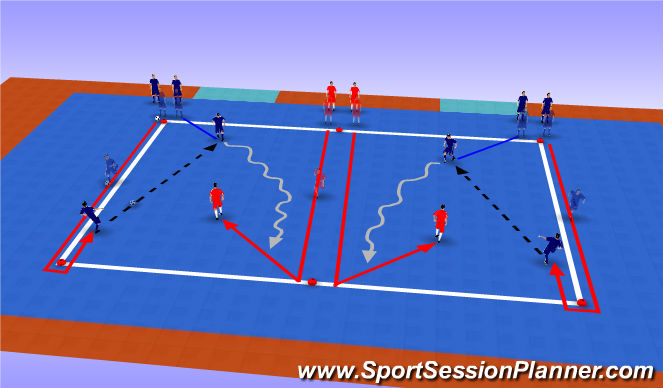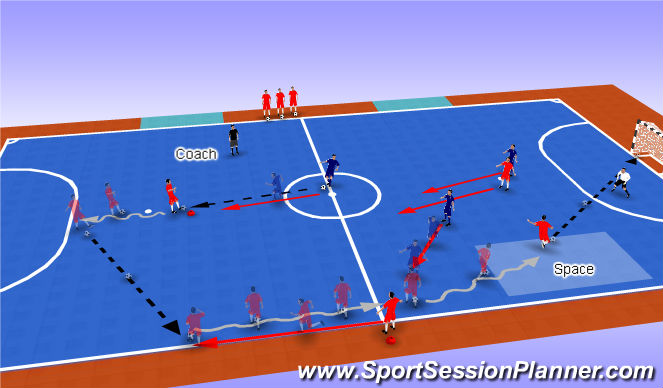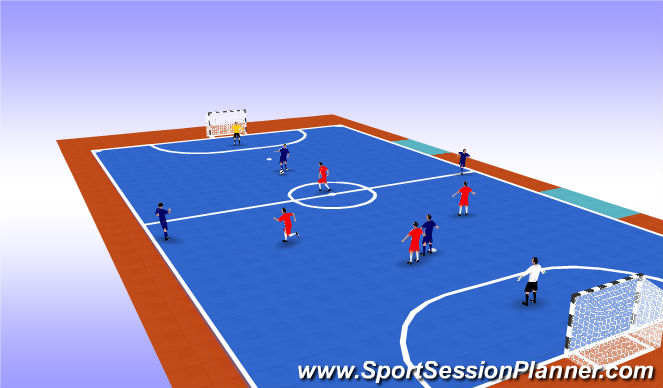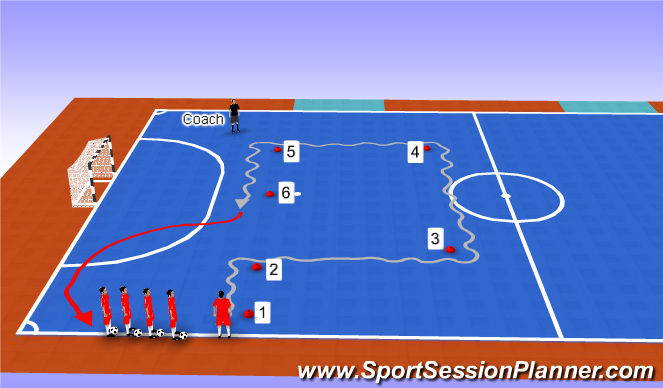Futsal Session (Junior): Dribbling
Profile Summary

| Name: | Cameron Gordon |
|---|---|
| City: | Canberra |
| Country: | Australia |
| Membership: | Adult Member |
| Sport: | Futsal |
Description
From a technical perspective, dribbling is a players biomechanical execution of a movement with the ball.
From a tactical Perspective, the aim of dribbling is to go past an opponent or attack the open space.
Developing a players tactical awareness of when and where to dribble the ball is just as important as developing their technical ability to execute the intended action.
***
Coaching Points:
1. Close ball control;
2. Dribble with an open body shape;
3. Dominate the space of the defender;
4. Identify space and single lines of defence to exploit; and
5. Change! (Mind, Speed and/or direction)

See the guidance at the top of this page to understand why you are not seeing interactive Futsal images.

Learning Objectives

|
Technical Close ball control and protecting the ball when dribbling. |

|
Tactical Dominate the space of the defender. |
Functional
Set Up:
Dimensions: Two 20m x 10m grids.
Equipment: 6 cones, at least two balls.
Players: 2 attackers and 2 defenders.
---
Drill Coaching Points:
1. Close ball control;
2. Protecting the ball when dribbling (dribbling with the furthest foot from the defender); and
3. Dominate the space of the defender (using body feints and changes of speed/direction).
---
Drill:
Step 1: The defending player starts with the ball. The defender passes the ball to the attacker to start the play; and
Step 2: The attacker tries to dribble past the defender and over the line.
---
Rotation: Once all of the attackers have had a turn, the teams swap roles and the drill repeats.
Progression: If one of the groups finishes their action before the other, the attacker may join the other group, creating a 2v1.
Condition: If a pass is made, the receiver of the pass must dribble the ball and cannot pass again.

See the guidance at the top of this page to understand why you are not seeing interactive Futsal images.

Learning Objectives

|
Technical Close ball control, dribble with an open body shape and protecting the ball. |

|
Tactical Dominate the space of the defender and identify space and single lines of defence to exploit. |
Advanced
Set Up:
Dimensions: Full court
Equipment: 2 cones, at least one ball
Players: 3 attackers, 3 defenders and a GK
---
Drill Coaching Points:
1. Close ball control;
2. Dribble with an open body shape;
3. Protecting the ball (dribble control should be with the furthest foot from the defender);
4. Dominate the space of the defender; and
5. Identify space and single lines of defence to exploit.
---
Drill:
Step 1: The 1st defender starts with the ball. They play a pass to the Anchor and apply pressure. The Anchor must dribble the ball away from the approaching defender to create time for the flank to drop off and support the ball;
Step 2: The right flank drops off to support the ball and receives a pass from the Anchor;
Step 3: The right flank dribbles down the line and the 2nd defender apply's pressure, creating a 1v1 situation;
Step 4: The Pivot makes a run to support the flank, either centrally or to the sideline, and they are tracked by the 3rd defender;
Step 5: The right flank must identify where the space is (central, or down the line) and attack it.
---
Rotation: Once the play has ended:
- the 1st defender becomes the 2nd defender;
- the 2nd defender becomes the 3rd defender;
- the 3rd defender becomes the 1st defender;
- the right flank collects the ball and joins the end of the attacking line on the other side of the court;
- the 1st person in the attacking line becomes the new Anchor and gives their ball to the 1st defender;
- The Anchor becomes the new Pivot;
- The Pivot becomes the new Right Flank;
- Once three actions have been completed, change the three defenders with attackers.
---
Progression: Change the right flank to a left flank.

See the guidance at the top of this page to understand why you are not seeing interactive Futsal images.

Game
Set Up:
Dimensions: Full size court
Equipment: 1 ball
Players: 8 x players and 2 x GK
---
Drill: Play a normal game.
---
Condition: Bonus goal can be awarded if a team scores from an opportunity created by a successful dribble.








 Play animation
Play animation Play step-by-step
Play step-by-step Repeat (toggle)
Repeat (toggle) Full Screen
Full Screen Pause
Pause Stop
Stop
Basic
Set Up:
Dimensions: Half court.
Equipment: 6 x cones, 1 x ball per player.
Players: All players involved.
---
Drill Coaching points:
1. Close ball control; and
2. Using the correct method of dribbling (forwards, backwards, lateral).
---
Drill:
Step 1: Player dribbles forwards from cone 1 to 2;
Step 2: Player dribbles laterally (sideways) from cone 2 to 3 (using their left foot, which is the furthest foot from the direction they are travelling);
Step 3: Player dribbles forwards from cone 3 to 4, increasing their pace;
Step 4: Player dribbles laterally (sideways) from cone 4 to 5 (using their right foot, which is the furthest foot from the direction they are travelling);
Step 5: Player dribbles backwards from cone 5 to 6, using the soles of their feet;
Step 6: Once the player reaches cone 6, they turn and join the back of the line to repeat the process.
NOTE: When the first player reaches cone 3, the next player in the line commences their movement through the cones.
---
Progression: On the coaches call, players must stop the ball, make feint in one direction (other than the way they were dribbling) and then continue dribbling the ball. This should focus the players on keeping the ball under close control at all times to ensure they can react quickly to the coaches call.
---
Difficulty Progression: Players move through the cones as before, but they must always have their body position always facing the coach. The coach changes their position around the court gradually. The players must now look up to identify where the coach is and use the appropriate type of dribble (forwards, backwards or lateral) to move between the cones while keeping their body position facing the coach.